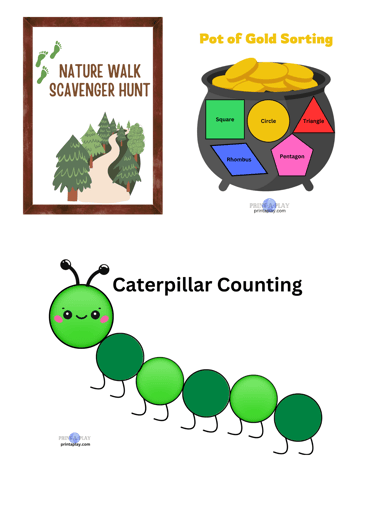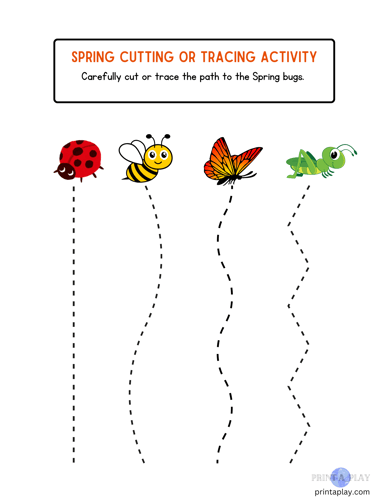How Child Printables Support Early Learning & Social-Emotional Skills
Read this week's post about how printables are not only fun but also support children's learning and social-emotional skills.
Tiana Conway
3/20/20254 min read


Hello everyone! This week I was working on making some more printables - yay! And I realized that everyone may not know all the benefits printables can have (besides just being fun and entertaining for children). I hope you all enjoy this read about all the ways printables can help children with their learning.
As parents and caregivers, we are always looking for fun and effective ways to help our little ones grow. Printable activities are a fantastic tool for supporting both early learning and social-emotional development. Whether it's a simple colouring page or an interactive worksheet, these printables provide structured yet playful ways to build essential skills. Let's explore how they help children learn and grow in meaningful ways:
1. Building Early Learning Skills
Printables offer an engaging way to introduce and reinforce foundational academic skills. These activities support learning in various ways:
Fine Motor Development: Tracing letters, cutting shapes, and colouring help improve hand-eye coordination and pencil grip, which are essential for writing. Also, by children doing these activities repetitively they develop muscle memory.
Early Literacy & Language Skills: Alphabet worksheets, letter recognition printables, storytelling prompts, and circle time activities encourage children to develop strong reading and writing skills. Simply reading books with your child and engaging with them in this way can enhance their reading skills and sometimes could extend into a love for reading and creativity.
Math Readiness: Number tracing, counting exercises, shape recognition, patterns, and sequencing activities lay the groundwork for math comprehension. A great example to use math in a simple way and out in nature is sorting two items in separate piles and then counting with you child(ren) how many of each you have. For example, you are out on a nature walk and are collecting rocks and pinecones. Your child(ren) can take these two items and sort them into separate piles (doing this builds recognition skills) and then together you can count out how many of each you have (helps build counting skills).
Critical Thinking & Problem Solving: Puzzles, mazes, and matching games encourage cognitive development and logical reasoning. Check out my memory games in my store!
By making learning fun and hands-on, printables keep children engaged while strengthening these essential academic skills.
2. Encouraging Social-Emotional Development
Beyond academics, printables can help children develop emotional intelligence and social skills. Activities focused on emotions, kindness, and communication foster healthy emotional growth. I am planning on releasing more activities centered around this, so keeps your eyes and ears open for this! (Psst... maybe come back on FREEBIE FRIDAY...)
Identifying & Expressing Emotions: Printables featuring facial expressions, feelings charts, and “How do you feel?” worksheets help children understand and communicate their emotions. I also find that a great time to talk about emotions is during circle time because there are so many great children's books centered around feelings and emotions.
Empathy & Kindness Activities: Colouring pages and role-playing scenarios teach kids about being kind, sharing, and understanding others' perspectives. I like doing activities about having to sort out things that are kind or not kind because it helps children to recognize what actions show kindness to others and which may hurt others or their feelings. Although teaching kindness to others is so important, we should never forget to teach children to show kindness to themselves as well.
Self-Regulation Skills: Mindfulness printables (ex. yoga and movement cards), breathing exercises (ex. smell the flower, blow out the candle), calming strategies (ex. sensory/fidget toys), and reading books help children manage frustration, develop patience, and become aware of their own emotions. This is such an important skill for children to develop. Most of us adults are still learning what helps us to self-regulate so doing activities with children that enhance these skills can only be beneficial.
Social Interaction & Cooperation: Printable board games and partner activities encourage teamwork, turn-taking, and communication.
These activities give children the language and tools they need to express themselves and navigate social situations with confidence.
3. Creating a Fun & Supportive Learning Environment
One of the best things about printables is their flexibility. They can be used at home, in classrooms, or even on the go. Here's how to make the most of them:
Incorporate Them into Daily Routines: Morning activities, bedtime colouring pages, or after-school activity sheets help create structured learning moments.
Make Learning a Game: Turn printables into a scavenger hunt, sticker reward chart, or fun challenge to keep kids engaged.
Encourage Independence: Printable task lists and self-led activities teach children to complete tasks on their own, boosting confidence and responsibility.
Use Them for Quality Bonding Time: Sit down with your child to work on a printable together—whether it's a craft, an educational worksheet/printable, or a conversation starter.
4. Printable Activities for Different Age Groups
Printables can be tailored to a child's developmental stage, ensuring the activities are both fun and educational:
Toddlers (Ages 1-3): Simple colouring pages, shape sorting activities, movement activity cards, beginner tracing sheets and so much more.
Preschoolers (Ages 3-5): Alphabet, number, and pre-writing practice, as well as emotion recognition activities - these, in my opinion, are far more important than the forementioned choices.
Early Elementary (Ages 5-7): Reading comprehension worksheets, math exercises, and problem-solving puzzles.
Older Children (Ages 7+): Advanced storytelling prompts, creative writing exercises, and STEM-based printables.
No matter their age, children benefit from printable activities designed to meet them at their current stage of learning and development.
Conclusion
Printables are more than just a fun pastime—they are a powerful learning tool that supports both cognitive and social-emotional growth. By incorporating printable activities into your child's routine, you create opportunities for meaningful learning, creativity, and connection. Whether your child is practicing their ABCs, exploring emotions, or learning to share, printables provide a hands-on, engaging way to develop essential skills. I just want to say that all skills mentioned in this post are important, but I think that the most important skills to focus on before kindergarten (and even after) are social-emotional skills and self-regulation. These are what help children develop their social skills, establish daily routines, and emotional recognition.
Don't forget to check my store for some fun printables and stay tuned for more to be released!
If you like what you are seeing please follow me on my social media pages (links can be found at the bottom of the page).
Hope to see you all back here soon!
Tiana




Print-A-Play
Engaging printable activities for children and families.
Contact
support@printaplay.com
© 2025. All rights reserved.
